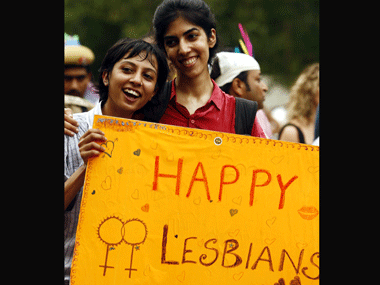It’s not easy to be ‘out’ as a homosexual at an Indian company. Very often theybecome the butt of their straight colleagues’ jokes, they aremimicked and they are made to feel like they are not ’normal’.
“It spooks me when my gay colleague touches me,” said an acquaintance yesterday when we were discussing the Supreme Court verdict thatdescribed homosexuality as a criminal offence. And this attitude is unfortunately not only the norm, but one of the more polite ways of expressing how people deal with homosexuality in the workplace.
Many multinational companies based in India have, over the years, tried to put ininclusiveHR policiesfor theLesbian, Gay,Bisexual&Transgender(LGBT) community,in an effort to reduce workplace bullying and discomfiture.
[caption id=“attachment_1283981” align=“alignright” width=“380”]  Reuters[/caption]
So, will the SC verdict now change everything? Will companies now halt all the policies that they had started putting in place for the benefit of the queer community? Will homosexuals, who were being accepted for who they were at the workplace, be forced ‘into the closet’ once again?
Firstpost spoke to the a few multinationals based in India, to ask how or if the Supreme Court verdict would change their workplace policies.
IBM India, which had introduced a reverse mentoring project, the Employee Alliance for Gay, Lesbian, Bisexual, and Transgender Empowerment (EAGLE), a year ago, vowed to remain committed to inclusion irrespective of sexual orientation.
Impact Shorts
More Shorts“IBM remains committed to promoting a culture of inclusion for all, regardless of race, gender or sexual orientation,” an IBM spokesperson told Firstpost.
In IBM’s EAGLE project, queer employees who feel uncomfortable about being ‘out’ in the workplace, is paired up with a senior employee who will act as a mentor, so that he/she can freely discuss issues ranging from alternative sexuality to queer pride events and career advancement.
Apart from the mentoring programme, the company also offers benefits-including pension plans, medical insurance, wedding leave and compassionate bereavement leave-to same-sex couples across several global offices including in India. Interestingly this was implemented in India following the landmark verdict by the Delhi High Court in 2009.
Infosys, which also spoke to Firspost, said that their policies are unlikely to change in the light of the situation.
The InfosysGays Lesbians and you (IGLU), an employee resource group for the LGBT community in the company, was set up last year. IGLU aims to create a safe and respectful work environment for employees from the LGBT community.It conducts awareness programs and exclusive events to create awareness and foster inclusion.
“We do not foresee any changes to the policies that we have in place. The focus at Infosys has been to ensure that employees have a safe and harassment free work place irrespective of their sexual orientation or gender identity,“an Infosys spokesperson said.
However, the company said that policies at Infosys are reviewed on a regular basis and aligned to the law of the land of the individual countries in which they operate. “We align the policies as per the mandates and compliance requirements for each of the locations,” Infosys said.
However, not all companies have decided if their LGBT policies will change in light of the Supreme Court verdict.
Google, which runs an India chapter of its LGBT employees - a voluntary employee resource group called the ‘Gayglers’ - said that it was too early to comment.
“We are reviewing the situation and will want to understand the full legal implication of the ruling. It is too premature to comment on the impact that it may have on ongoing diversity programs,” a Google spokesperson told Firstpost.
Manish Sabharwal, Vice President of Teamlease–a HR consultancy firm believes that most companies will continue to follow a"Don’t ask, don’t tell policy.” Sabharwal pointed out that most companies in India do not even have a proper LGBT policy in place. “Employers’ decision on hiring will definitely not be on the basis on whether the person is gay or straight, but once hired, they will have to follow the ‘don’t ask, don’t tell’ policy,” he said.
Sabharwal said that the few India based companies that have LGBT policies will now have to review them and check their legality.
A HR employee from Intel, who wished to remain anonymous, told Firstpost that though Intel has a strong diversity culture, it has not yet been decided if the company will change its policies following the verdict. “It’s still under wraps, the HR department will be meeting legal heads to decide what will happen,” the employee said.
According to a LGBT Resource Guide created by Google, IBM, Goldman Sachs and Community Business last year, the LGBT community makes up about 5-10 percent of India Inc’s workforce. Around80 percent of them report hearing homophobic comments, jokes or anti-gay rhetoric at their workplace.


)

)
)
)
)
)
)
)
)



